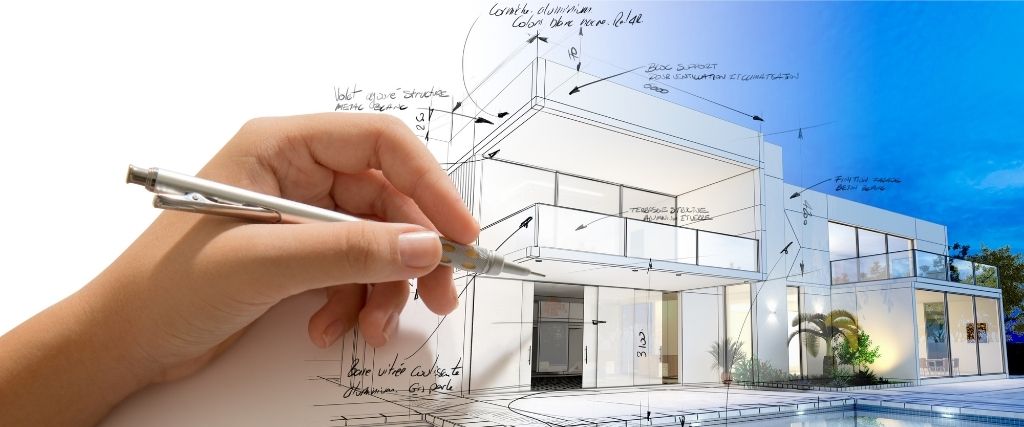Building your own home is a dream for so many people. By doing so, you create a home perfectly made for you and your family. Many wonder though, how long does it take to build a home, especially in the South? At MLM Incorporated, we’ve helped many through this process. We discuss the average new home construction timeline, complicating factors, and a general overview of the home building process here. If you have any questions after reading, feel free to contact our team at MLM Incorporated to learn more.
What’s the average time to build a home?

Before you begin building your home, you’ll need to have your lot and financing secured, and then ensure you have the appropriate building permits in place before construction can begin. According to data from the U.S. Census, permit authorizations in the southern U.S. take an average of 33 days.
The amount of time for your new single-family home construction will depend on a few variables. On average, after all of the permits are approved, new homes typically take five months to two years to build. Those built for sale average seven months from permit to completion, while new builds undertaken by the owner average 13 months. Homes built by a contractor ensure you get the customization you want in less time, often averaging nine months from initial permit to completion.
The South does have the fastest average time from authorization to construction completion in the U.S., averaging seven months in 2018. At MLM Incorporated, we tell our prospective clients that a standard new construction takes five months after permit approval, pending the size and complexity of their new home plans.
Factors that can extend your timeline
At MLM Incorporated, we know that building your new home is an exciting time, full of firsts. The first time you see your countertops. The joy of seeing your walls framed. The first feeling of your new carpet underfoot.
Because of these incredible firsts, we work closely with our new home builders to discuss all aspects of the home building process. This includes talking about the common factors that can delay their home construction. The largest of these is a lack of planning.
Inadequate planning
Like everything in life, coming up with a solid plan beforehand can greatly reduce your overall time frame.
Building a new home is a tightly choreographed and interrelated routine. A single update four months into your build could affect your overall timeline. Making multiple, ongoing adjustments can mean a much longer build-time. These updates don’t only impact the need for additional rework. They can cause delays if you’re ordering specialty pieces or need an in-demand professional to finish the work.
Because of this, your home builder should have a detailed list of questions and selections for you to make when designing your home. This should cover everything from the floor plan to sink position to electrical outlets to tile size (and much more). At MLM Incorporated, we also have pre-designed floor plans that can speed up the building process. These make it easier to start your planning, but also allow you to put your own touches on your final design.
Project scale and scope
As expected, larger houses take more time to build. However, other factors are just as important.
Where you build your house—a hilly lot versus a flat one—can influence your final timeline. Adding a basement, big deck, or other large features may also take more time. Working from a fully custom floor plan versus customizing a pre-designed one can add time.
Finally, the finishes and styles you’ve chosen for your home have a bearing. For example, intricate tile or metalwork in your bathrooms or kitchen may mean ordering in these specialty items and waiting for an experienced contractor to install them.
Factors outside of your control
When building a new home, the planning process is most in your control. Unfortunately, there are a few factors that can extend your new home construction timeline that are largely out of your control.
These include:
- Local availability for subcontractors, like electricians or HVAC specialists
- Weather, especially during key construction stages like pouring the foundation
- Your city’s inspection processes and availability
By working with a highly experienced builder, you can avoid many of these challenges. They’ll already have relationships built with technicians in your area and understand your area’s inspection processes. They also know how to best schedule your construction to avoid (but unfortunately not prevent!) weather concerns.
What’s the timeline for building a new home?
Most new home constructions follow a general timeline. Your builder will likely give you a packet or electronic resources that outlines each step of their construction process.

During the build, talk to your homebuilder often to see what progress has been made or to ask questions. However, while you can and should visit the build site often to watch your dream home being made, do so after talking to your builder. For safety reasons, it’s best to schedule a time in advance to visit your site for walk-throughs.
We typically recommend that our buyers visit the site at least three times: once the home is surveyed and staked, after framing and mechanical installations, and during the final walk-through. All are welcome, of course, to visit more often.
After all of the permits are approved and your lot is cleared of any debris, most builds follow these general steps. Note that some steps (like roofing or landscaping) may occur at different points, depending on local availability and season.
Foundation
Every home needs to sit on a secure and sturdy foundation. If your home has a basement or crawl space, they’ll be dug at this time.
Once your concrete foundation is poured, it needs time to dry and cure. If you’re visiting the site, you generally won’t see any work being done at this time. Once it’s cured, most cities send out an inspector to ensure your foundation is up to code, safe, and properly installed.
Framing
The next phase of work will happen unbelievably fast. Framing a house—creating the wooden exterior frame that makes up the “skeleton” of your home—typically only takes a few weeks. Your floor and roof rafters will go up at this time too, and you may see your windows and doors installed.
Another inspection usually takes place after to ensure your framing was done securely.
Mechanical
Next, technicians will set up the usable portions of your house. It won’t seem like much work is happening (since it’s mostly hidden in the walls), but this is when your house truly becomes a home.
Often ductwork for an HVAC system is done first. Electricians will wire the house, while plumbers set up bathrooms, kitchens, and any other plumbed areas. Again, an inspection will take place after these are all done.
Insulation and drywall
While you had a sense of your space before this step, adding insulation and then drywall creates the rooms you’ve been planning for months.
This stage lays the foundation for proper heating and cooling in the future. The inside of your home will also become instantly quieter.
Roofing, siding, and landscaping
The exterior of your home will often keep pace with inside progress. Different teams will likely work concurrently when safe to do so.
At these stages, your home will get a roof as well as exterior work, like brick, stucco, or architectural details. If major construction has already taken place, the initial work of grading your yard may begin.
Trim
There are many details that go into creating a home, with many different technicians completing the work. Depending on your choices, your builder will be installing:
- Door and window frames
- Baseboards
- Hard floors
- Cabinets
- Counters
- Wall texture
- Initial painting
- Molding
- Handrails
- Light switches
- Electrical outlets
Finishes and fixtures
Again, a lot will happen in this final stage of construction. Expect to see the following at your new home:
- Carpet
- Sinks
- Faucets
- Appliances
- Light fixtures
- Doorbell
- Knobs and pulls
- Technology, like speakers, security systems, or your home network
- Interior finishes and exterior paint
- Final landscaping work
After this stage, the city and then you will do your final inspection. We recommend bringing a new construction punch list at this time to go over every item that’s supposed to be in your home.
Build your home with MLM Incorporated
At MLM Incorporated, we know how exciting the new home construction process is. It’s an honor to build houses that become homes for our community.
Our team has been building and renovating residential homes across New Orleans and the surrounding areas since 2006. We are your complete building specialist and will work tirelessly to bring your dream to life.
Ready to start planning your new home? Set up a consultation with our team

